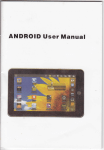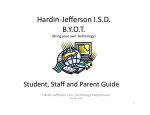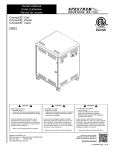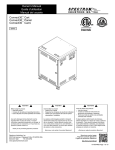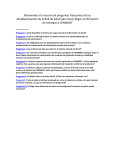Download BYOD Guidelines - Calhoun County Schools
Transcript
Student, Teacher & Parent Guide January, 2013 From the Superintendent... Calhoun County School System is commi1ed to moving students and staff forward in a 21st century learning environment. That’s why we have commi1ed to allowing students to POWER UP during the school day by allowing them to Bring Their Own Digital Device (BYOD). Our POWER UP BYOD LEARNING INITIATIVE allows students to bring their own digital devices to school to encourage achievement, engagement and developing 21st Century Learners. Calhoun County School System is preparing for your child’s future by implemenRng this BYOD iniRaRve. We have commi1ed funding for network upgrades and professional development for teachers and staff to begin to incorporate these digital tools into their daily instrucRon. With this iniRaRve, and under the direcRon of classroom teachers, students will be allowed to access our wireless network using their own mobile devices during the school day. Beginning January, 2013, our POWER UP BYOD LEARNING INITIATIVE will be implemented across the district. This iniRaRve will start with five (5) SITE schools: Ohatchee High School, White Plains High School, White Plains Middle School, Weaver Elementary School, and Saks Elementary School. During the Spring, 2013, all other schools, termed VISITING schools, will receive training in preparaRon for full implementaRon during the 2013-‐2014 school year. Please know that our first priority of this iniRaRve is to provide a safe and secure environment for your child. This handbook is designed to provide our educaRonal community with guidelines and informaRon to make our POWER UP BYOD LEARNING INITIATIVE successful. In closing, we look forward to conRnued success for our children as we strive to produce producRve ciRzens that will make a difference in our society. Joe Dyar Superintendent Calhoun County School System BYOD Definition Calhoun County Schools defines BYOD as a privately-‐owned, Internet capable electronic mobile device (see handbook for specific devices that can be brought to school) that can be used during the school day to increase student engagement and facilitate learning. Under teacher supervision, students may use their own device in the classroom to enhance student learning. Connectivity & Safety Calhoun County School System believes that Internet Safety is of utmost importance. As such, all students who bring devices to school to use as part of the POWER UP BYOD LEARNING INITIATIVE should connect to the CCSPOD network. Teachers and administrators will provide students with the password for this network. By using the CCSPOD network, this will ensure that BYOD devices have appropriate network filters and comply with the Child Internet ProtecRon Act (CIPA). Students will only use the CCSPOD network in school. Any a1empt to bypass the network by using 3G or 4G cellular data network will be considered a policy violaRon resulRng in loss of BYOD privileges. Students and parents should be aware that data is being recorded as to sites visited by each device. AddiRonally, as part of this iniRaRve, teachers will incorporate digital ciRzenship as part of their instrucRon. Security and Damages Calhoun County School System is not liable for any device that is stolen or damaged. UlRmately, the responsibility to keep the device secure rests with the individual owner. However, if a device is stolen or damaged, it will be handled through the administraRve office similar to other personal arRfacts that are impacted in similar situaRons. Devices will need to be labeled with personal markings to physically idenRfy your child’s device from others. AddiRonally, a protecRve case for the device is suggested. Teachers’ Role Teachers are facilitators of instrucRon in their classrooms. Therefore, they will not spend Rme fixing technical difficulRes with students’ personal devices in the classroom. They will educate and provide guidance on how to use a device and troubleshoot simple issues, by they will not provide technical support. This responsibility will reside at home with parents/ guardians. Teachers will regularly communicate informaRon regarding educaRonal applicaRons and suggest appropriate tools that can be downloaded to personal devices at home. Parents will need to assist their children with downloads if they wish to follow teachers’ suggesRons. No applica)ons should be downloaded at school without express instruc)on from teacher. Teachers will present the rules and procedures to the students. Teachers will monitor students to ensure appropriate usage of technology in the classrooms. All acRviRes involving technology will be based upon and support the College and Career Standards. Calhoun County School System understands that not every student has his/her own electronic device. To ensure equal accessibility to technology resources, teachers will provide students with technology available within each school. All rules, policies, and procedures will sRll apply. Use of Devices Devices cannot be used, unless directed by school personnel. Students must immediately comply with teachers’ requests to shut down devices or close the screen. Students must put away DEVICES when directed by teachers. Students should not use devices in bathrooms or locker rooms. Students Will... • bring their devices to school fully charged. • only use headphones and earphones when directed by school personnel • not use any technology to harass, threaten, demean, humiliate, inRmidate, embarrass or annoy fellow students or others in their community. This unacceptable student behavior, known as cyber bullying, will not be tolerated. and will be subject to disciplinary acRon. • store their personal devices in appropriate areas (book bags, lockers, etc.) Parental Permission Students and parents must both sign the Parent/Student Contract at the end of this document in order for a student to bring his/her personal device to school. If parents choose not to allow their student to bring their device, please be aware that it is the responsibility of the parent to make sure that the student does not bring a device to school. Student Frequently Asked Questions: I have my laptop with me in class. How do I get on the Internet now? Answer: Most laptops or other personal devices (smart phones), will detect a wireless connecRon when you are near one. Most of the Rme your technology tool will ask you if you would like to join the network. When prompted, choose CCS POD from the list. Your teacher will have the password. Once you choose this network, you will be prompted to. Read this carefully, so that you know what should be expected. My laptop is not promp)ng me to choose a wireless network. Is there another way to connect? Answer: In the seengs menu of your device, there is usually an icon for a network, go to this icon and choose the CCS POD from the list or prompt your computer to look for wireless networks in range. Always consult your tool’s owner’s manual for exact direcRons for accessing a wireless network. I brought my iPad to school to use in the classroom, but my teacher said I couldn’t use it in her classroom. Can I s)ll use it? Answer: The teacher in the classroom is the final say on procedures in the classroom. If he or she asks you not to use your technology tool, then you should follow those direcRons. Access is only available, not guaranteed for each classroom situaRon. I brought my iPad to school to use in the classroom, but my teacher said I couldn’t use it in her classroom. Can I s)ll use it? Answer: The teacher in the classroom is the final say on procedures in the classroom. If he or she asks you not to use your technology tool, then you should follow those direcRons. Access is only available, not guaranteed for each classroom situaRon. I just can’t get my laptop to connect to the network. Can I get some help from someone? Answer: Resources may be available to help you connect to the CCS POD on your campus; however, you will need to consult with a campus administrator for these resources. It is not the responsibility of your teachers or other CCBOE staff to troubleshoot individual devices during the school day. Check your owner’s manual for issues concerning connecRvity. I need to save my work in my CCBOE shared folder. Why can’t I access this resource? Answer: You are on the POD Network. It is not the same as the network you would normally access from a campus computer. You will not see your shared folder, so you will need to save your work in another place. Some opRons include a flash drive, your own hard drive, or your digital Internet based storage. I need to print the spreadsheet I just created, why is there no printer listed when I try this? Answer: Like the shared folders, printers are networked differently on the campus and will not be available when you login to the POD network. Some prinRng soluRons include, emailing the document to your teacher to print, save it to a flash drive and print it from home or another campus computer. Keep in mind that using campus printers in the classroom or other learning spaces is at the discreRon of the teacher or campus administrator. My laptop was stolen when I brought it to school. Who should I contact about this? Answer: Bringing your own technology tools to school can be useful, however some risks are involved as well. It is always a good idea to record the device’s serial number to have in case of thei. CCBOE is not responsible for the thei of a device nor are we responsible for any damage done to the device while at school. Any Rme a thei occurs, you should contact a school administrator to make him/her aware of the offense. Why am I filtered on my own computer? Shouldn’t I be able to see what I want to on my own tool? Answer: Student filtering is a requirement of all public schools. The Children’s Internet ProtecRon Act (CIPA) requires all network access to be filtered, regardless of the tool you use to access it while in a public school. Your laptop or phone is the device, the network you are using while at school belongs to CCS POD and will be filtered. Am I s)ll held accountable for the Acceptable Use Policy I signed at the beginning of the school year even though this is my own personal computer? Answer: Yes. The Acceptable Use Policy for CCBOE remains in effect even when you are using your own laptop, smart phone, iPad etc. Each Rme you a1empt to access the network at school you will be prompted to accept the terms of service which include the AUP. ViolaRng the terms of the AUP would be a student code of conduct violaRon and would be dealt with on the campus with a campus administrator. The AUP is part of the Student Code of Conduct. Why can’t my liMle brother bring his laptop to school? He is in the 1st grade? Answer: This semester, we are limiRng this privilege to selected SITE schools and grade levels. Your parRcipaRon in this iniRaRve will help us determine the best way to carry out this plan on other campuses. We will learn from you and your usage and issues so that next year we will be able to make the needed changes and add to the program for other secondary users. Staff Frequently Asked Questions: Some of my students cannot access the network on their laptops or phones. I don’t have )me in a class period to help them with this. Should I put in a help request or call the help desk? Answer: No. Students who cannot access the CCSPOD network or who may have technical issues with their technology tool need to take care of this issue by working with their user’s manual that came with the device out of the classroom. These are not CCBOE devices and the district is not allocaRng resources at this Rme to troubleshoot issues. You are welcome to help if you choose, but it is not a staff member’s responsibility to ensure that student owned technology is funcRoning properly. Contact your local school administrator to determine if you need addiRonal Internet bandwidth/ wireless connecRvity. I have students on my campus who are accessing the Internet using their provider’s data plan (AT&T, Sprint, Verizon etc.) on their smart phones or laptops, hence bypassing the filter. Is this a viola)on of the student AUP? Answer: This is not an AUP violaRon because the student is not bypassing the filter on the CCS network, but instead using a provider’s data plan. However, as part of this iniRaRve, we are requiring students to use the CCSPOD network while on school campus. Using their own personal data plan on campus can result in loss of privileges of the BYOD iniRaRve. I have my own laptop and a smart phone. I would like to u)lize these tools at work. Does this new plan include campus staff? Answer: Yes. Campus staff can also access the CCSPOD network. Keep in mind that the CCSPOD network is filtered at the student level for everyone accessing it. Campus printers will not be accessible with your own devices as well. One of my students was using his laptop to bully another student on campus. Should I call the central technology office concerning this problem? Answer: No. Any disciplinary infracRons that occur from using technology tools should be referred to a campus administrator. This would be student code of conduct issue. Will students have access to any common soYware packages via the guest network access? Answer: Possibly, under teacher guidance, students will be able to use some common packages. (Examples: APEX, ACCESS, Success Maker, Google Apps) Should I call central office if one of my student’s laptops is damaged or stolen? Answer: No. Any thei issues should be handled as you normally would on your campus. CCBOE is not responsible for any damage or thei of student owned technology tools. It would be good to remind students to keep a record of the device’s serial number just in case a thei occurs. Parent/Student Contract **THIS FORM MUST BE SIGNED AND RETURNED IN ORDER FOR THE STUDENT TO B.Y.O.D AND ACCESS SCHOOL TECHNOLOGY. My parents and I have read and discussed the BYOD HANDBOOK and I, [print student’s name] __________________________________ agree that when using my personal device or the school’s technology: • I will only use the technology under school personnel direcRon. • I know that misuse of the technology could lead to disciplinary acRon. • I will not share any personal informaRon over the Internet. • I am responsible for my own device. • School staff is not responsible for any device lost, stolen, or damaged. • I will adhere to the policies and procedures stated in the Calhoun County School System Code of Conduct and any local school policies and procedures. I, [print parent’s name] ________________________________________ The parent/guardian of the above student, agree to accept all legal and financial obligaRons which may result from my son/daughter’s use of Calhoun County School District’s technology and Internet. I understand that school and district personnel are not responsible for personal devices that are lost, stolen, or damaged. I will not hold the school system responsible for inappropriate materials acquired through the Internet. Further, I accept responsibility for the acRons of my child. By signing below, we understand that the use of personal devices to support educaRonal experiences is not a necessity but a privilege. With respect of the rules, this privilege will benefit the learning environment as a whole. When rules are abused, privileges will be taken away. ________________________________ Student’s signature ___________________ Date ________________________________ Parent’s signature ___________________ Date **Please select from the list below the devices that your child may bring for BYOD (MAXIMUM OF 2 DEVICES). Kindle (Standard Kindle has very limited internet access) Kindle Fire Nintendo dsi Android Smart Phone iPhone Nook Wireless Capable Mini-‐Laptop Wireless Capable Laptop iPad iPod Touch Other Tablet School Specific Informa)on GOES HERE










